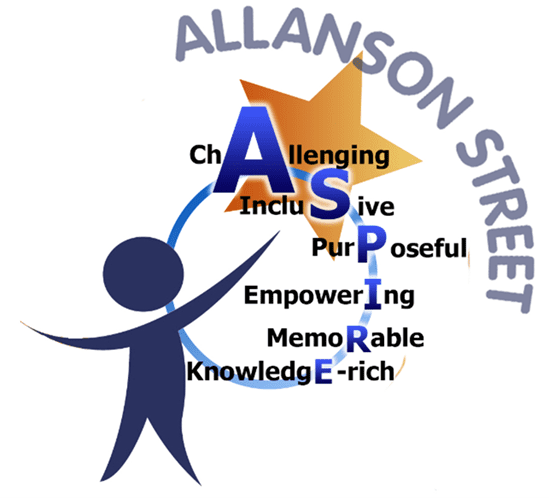At Allanson Street Primary School, we believe deeply in the importance of helping every child develop as a whole person – happy, loved, safe and ready to take the next steps into their education and lives beyond primary school. Regardless of their starting points or the obstacles they may encounter, we know with absolute certainty that our children are more than capable of becoming confident, productive citizens ready and willing to make a positive contribution to the world.
Based on our knowledge of the National Curriculum 2014, we have broken down the programmes of study into a series of skills and knowledge, and our long term curriculum plans show how, at Allanson Street, we cover the fundamental concepts of each national curriculum subject in a sequential, progressive way.
Our curriculum offer is underpinned by our ASPIRE curriculum principles which were decided upon following consultation with our school family.
Allanson Street Curriculum Principles
 |
Challenging – Every lesson provides appropriate challenge for all children, provokes thought and inspires curiosity.
Inclusive – We celebrate the diversity of the world in which we live and give every child a sense of belonging.
Purposeful – Children feel each step in their learning journey is relevant, progressive and has purpose in their world.
Empowering – Children develop confidence in themselves and their own self-worth, taking pride in sharing their thoughts and learning with others.
Memorable – Children are immersed in learning that provides meaningful connections which spark emotive responses.
Knowledge-rich– Knowing more and remembering more is at the heart of all learning.
ASPIRE – Every opportunity is taken to raise children’s aspirations, ensuring that they fully believe in their own ability to create a wonderful life for themselves.
|
Curriculum Concepts Identity, Legacy, Sustainability, Climate, Equality |
When deciding on the golden threads which weave throughout our curriculum, we chose concepts which really matter to our children and the future we want for them.
Identity -Children need to feel secure in their own identity as this enables them to develop resilience and an ability to adapt to new situations or circumstances.
Legacy –Children need to be aware that their actions now may impact them later in life. We want our children to strive to leave behind a positive legacy that they can feel proud of.
Climate – By educating children on global warming, several positive outcomes can occur, such as them being more aware of climate-friendly decisions they can make in their daily lives, crafting better environmental legislation in the years to come, and inspiring other young people around the world to also play their part in saving the planet.
Sustainability – Climate change is the problem – sustainability looks at the solution. Children need to learn both so that they are not left with a feeling of ‘doom and gloom’ and instead feel a sense of hope and empowerment.
Equality – Children have the right to be included. We aim to teach children to be able to identify examples of equality (and inequality) so that they can confidently address this as adults.
A curriculum which goes beyond the classroom
Whilst we are very proud of our planned curriculum, we know that the highest quality curriculum will always go beyond the classroom.
Our curriculum is carefully crafted so that our children develop their academic, social and cultural capital.
We have made informed choices about what experiences we want to include as part of our curriculum and how they will build over time. We include both off and on-site experiences in our curriculum and make the most of what we have locally including local businesses and charities.
Our cultural pathway forms just a part of our cultural offer yet it provides our children with a range of experiences which broaden their horizons, boost their confidence and equip them with the skills and knowledge to contribute to the betterment of their local community and beyond.

For more information about our curriculum, please explore the rest of our website, paying particular attention to our curriculum pages. If you have any questions or would like to know more, please don’t hesitate to get in touch with us via the Contact Us page.

